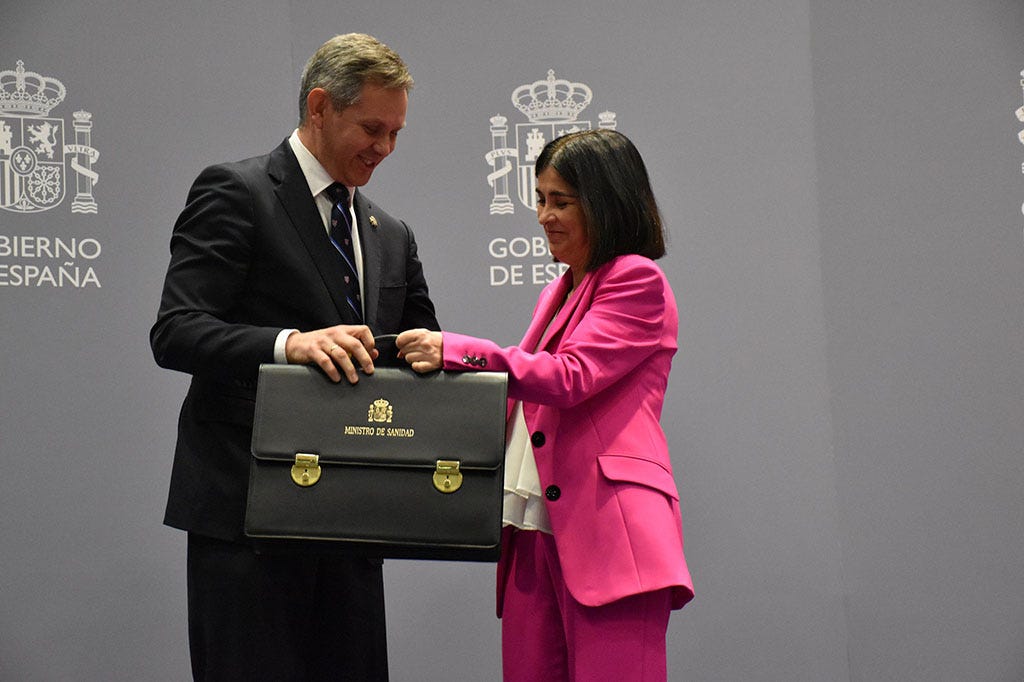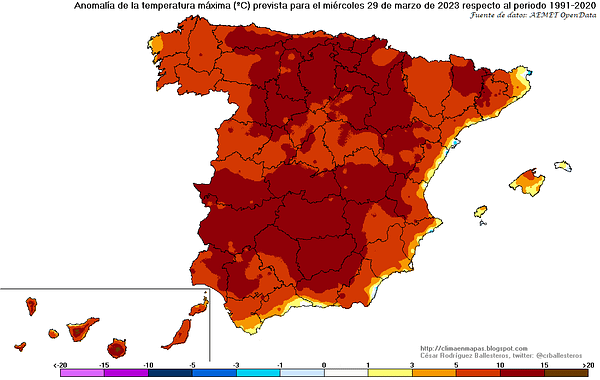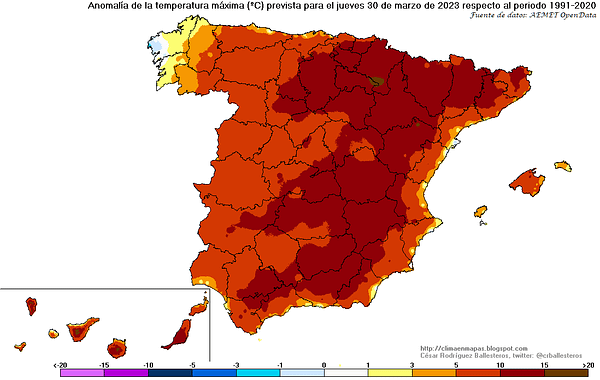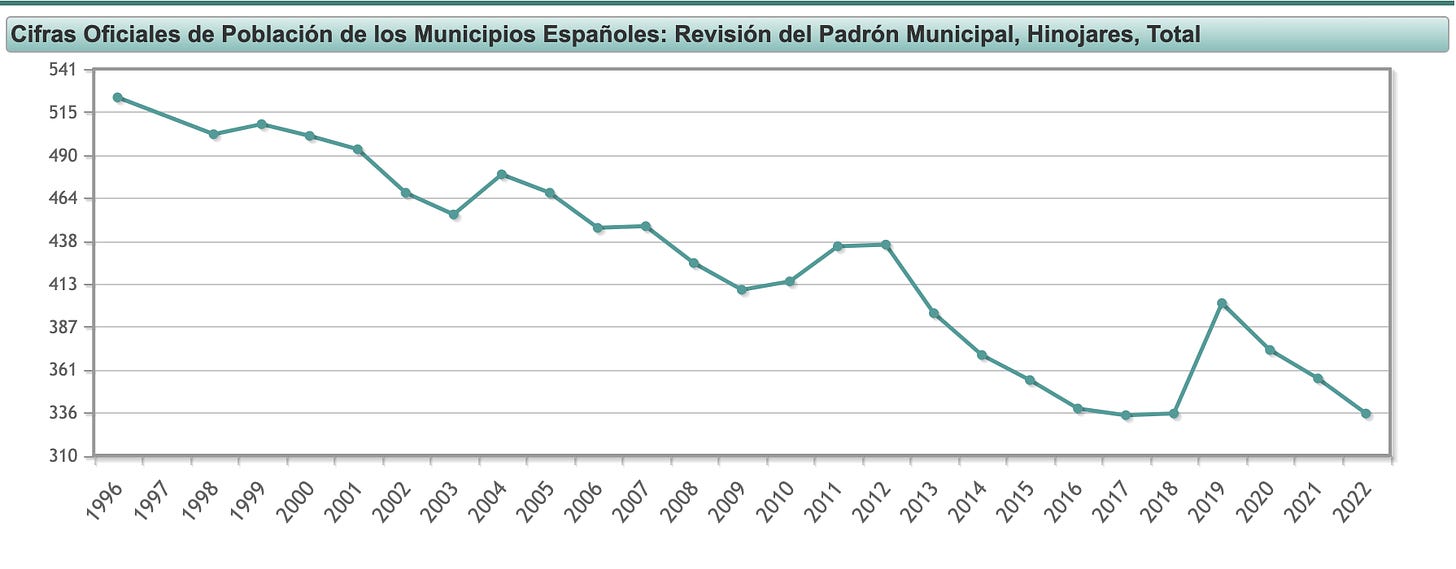🌞 This Week in Spain: Hot Times in the City
Also: Older mothers, fighting footballers and zombie pueblos.
By @IanMount and @AdrianBono | March 30, 2023 | Madrid
🎉 Welcome to the seventh issue of The Tapa (or The Brief, depending on what you voted last week), an English-language, weekly newsletter about all things Spain!
We hope you enjoyed our Friday edition last week. Don’t forget you’ll be getting it again tomorrow.
🥜 The Week in a Nutshell: A cabinet shake up, forest fires and the controversy about surrogate pregnancies. Also, Prime Minister Pedro Sánchez is off to a two-day official visit to China and is meeting with his Chinese counterpart Xi Jinping, while second VP Yolanda Díaz is expected to announce she’s running for the premiership this Sunday (we’ll cover those two stories next week).
🕺If you haven’t subscribed yet, please do so by clicking on the button below.
🫶 And if you already have, please send this newsletter around to your friends and family and help us keep growing.
Revolving cabinet doors
♻️ The 5th Government ‘Crisis’

What happened? Prime Minister Pedro Sánchez officially announced that he was replacing his Health and Industry ministers. The outgoing ministers, Carolina Darias (Health) and Reyes Maroto (Industry), are leaving to run in the regional elections on May 28 and will be replaced by José Manuel Miñones and Héctor Gómez respectively.
No one was surprised, for the simple reason that the plans have been making the rounds for several months now (at least since November).
First things first: While you may have heard reporters refer to this as a “government crisis”, it’s actually not a crisis, per se. That’s just how the media in Spain refer to a cabinet change that doesn’t take place at the beginning of an administration. So when headlines refer to this as the prime minister’s “fifth government crisis”, what they mean is that this is the fifth time he’s making cabinet changes since the forming of the coalition government three years ago.
Neither minister is leaving office in scandal or shame. Quite the opposite, as they abandon their posts to run in elections that at least one is expected to win.
Sánchez praised ministers on the way out, as he obvs would like both to win. He said Maroto, who’d been Industry, Trade and Tourism minister since 2018, was key in helping “boost trade and modernize tourism” after the pandemic.
Sánchez also called Carolina Darias work as Health minister “fundamental” to finally leaving the pandemic behind, and highlighted the “exemplary” roll out of the Covid-19 vaccine under her watch, which helped Spain become one of Europe’s vaccination champions.
Darias is following in the footsteps of her predecessor, Salvador Illa, who resigned from his post in 2021 to run in the Catalonia elections—and led the socialists to be the biggest group in the regional parliament, although not by enough to govern.
OK, but why is this relevant? Honestly, it’s not that exciting. But while it’s common in politics to see cabinet officials abandon their posts to run for office, there are a few things to take into consideration to understand why they are doing it this time:
PSOE’s Reyes Maroto is running for mayor in the city of Madrid, hoping to oust the PP’s José Luis Martinez Almeida. This will prove to be challenging as the PSOE hasn’t been elected in the city since 1999. Many voters on the left have abandoned the socialists for other parties like Más Madrid.
Polls show a strong lead for the PP-Vox coalition. However, PSOE is hoping to form a coalition with Más Madrid and other leftist parties to oust Almeida.
Carolina Darias is running for mayor of the city of Las Palmas, in the Canary Islands. The PSOE is already in power there, so her political future looks much brighter.
Darias is first in the polls and, just like Illa in 2021, she leaves office a popular political figure.
OK, so who are Miñones and Gómez? Honestly, there’s no reason you would know.
José Manuel Miñones is a pharmacist and former mayor of Ames (pop. 20,000), a town near Santiago de Compostela, in Galicia. He’s unknown on the national political scene, but he’s been a Sánchez loyalist since the two met almost 10 years ago. He was named the government’s spokesperson in Galicia two years ago.
His appointment as Health Minister is strategic, as it could help elevate his profile nationally, and specifically in Galicia, which is holding regional elections in 2024. The Galicia socialist party has no contender for next year’s race and since both Illa and Darias have left the health ministry with high approval ratings, it makes sense for Miñones to try to follow suit. Third time’s a charm?
Galicia is home of the Partido Popular’s prime minister hopeful Alberto Núñez Feijóo. And now that the conservative leader is in Madrid focused on the national race, Miñones is a tool to invade the PP leader’s former fiefdom.
Héctor Gómez is more used to the national stage, as he’s been at the helm of Turespaña, the government’s tourism institute—and as such was already part of Maroto’s team.
Originally from Tenerife, in the Canary Islands, he’s also the former PSOE caucus’ spokesperson in parliament and loyal to Sánchez. He was booted after a year as spokesperson, so his appointment rehabilitates him on the national stage.
This is an election year, so both Miñones and Gómez are expected to serve as ministers for only nine months.
Gender balance: While two women have been replaced by two men, the cabinet reaches parity. There are now 11 men and 12 women in it.
Bonus: Hello Sumar, or the end of Podemos. Sánchez’s minor Cabinet reshuffle prepares him for his big move in the elections at the end of 2023—bigging up Sumar, the new Yolanda Díaz-led left-wing party, to take the coalition spot now held by the troublesome Podemos.
Goodness gracious, great balls of fire
🔥 Hot Enough for You?
Spain is hot, dry and on fire. The current forest fires on the Aragón/Valencia border have “only” destroyed about 5,000 hectares of land, but the sense of foreboding created by such an early burn—barely into Spring—is immense.
Memories of the massive 2017 wildfires in Portugal—which killed more than 60 people in a weekend—and the ”Autumn from hell” in Galicia the same year are still fresh. Check out this map of historic forest fires.
PM Pedro Sánchez said, with justifiable worry, “We are just coming out of winter and we are facing fires typical of the summer months.”
So is 2023 set to be as tragic? Predicting the weather more than a few days out is obviously a fool's errand, but there is obviously reason to worry. Spain recorded its hottest year ever in 2022, and also its driest (save for 2005 and…2017). In fact, in 2022 Spain and Portugal suffered their driest climate in 1,200 years 😱.
Spain’s reservoirs have also been at historic lows. Indeed, a church tower recently emerged from a rapidly-depleting reservoir in Catalonia, where boats were catching tons of fish that would struggle to survive in the low-oxygen water “in order to protect drinking water.”
Meteorologists at Spain’s AEMET weather service note that right now we are expecting temperatures that are “very inappropriate for the end of March”—10-15ºC above the norm. 🌞



That’s only anecdotal evidence, you say. And you’re right. According to the oddly captivating Embalses.net, Spain’s reservoirs are 51.7% full, which while below the 10-year average of 65.3%, is still a nice bit above last year’s 46.9%.
But the proof is in the pudding…er, oil. Drought is expected to cut Spain's olive oil output this year in half compared to last year, Which wouldn’t be a big deal if Spain didn’t produce…40% of the world’s olive oil. Last year, olive oil prices rose 60% in Spain. Be prepared for more.
For now, it’s about the short term. Spanish police are telling ‘fire tourists’ to fuck off stay away from the forest fires, while local residents are talking about how they would have stayed to save their animals.
🔔 A Message From Our Sponsor
Bucólico Café is a project of connection that was born as a specialty coffee shop.
We value time and understand that it represents both a cycle and an instant—chronology and nostalgia. Bucólico is a space that connects one’s soul with the purity, lightness and beauty of the countryside—while being in the city. Via a cup of coffee, a piece of cake or a song…
Located on Calle de Barbieri 4 — a few blocks from Plaza Chueca — Bucólico reassures the soul with a feeling of home.
Follow Bucólico Café on Instagram.
💬 Five things to discuss at dinner parties this week:
1. The Lord giveth and the Lord taketh away
The PP has been using its alliance with Colombia-born evangelical priest Yadira Mestre to court the latino vote since at least 2017. It worked well for both without much drama: The PP got access to a big pool of voters with or on the path to citizenship, and Mestre got access to power. But then PP held the “Europa es hispana” event last Saturday. And things got weird.
PP boss Alberto Núñez Feijóo said at the event that he was "very proud" of "not paying homage to apprentice autocrats and real autocrats". This was taken by the PSOE (and many others) as a reference to PM Sánchez, who was at the Cumbre Iberoamericana in the Dominican Republic, alongside less-than-democratic Cuban President Miguel Díaz-Canel and Venezuelan Vice President Delcy Rodríguez.
Sánchez got ticked off and said that these diplomatic events had been going on for three decades and were very important. He was, he said, surprised by the “insolvency and bad faith” of Feijóo. The PSOE also noted that King Felipe VI was also at the event—and one thing the PP does not do is criticize the monarchy.
Feijóo climbed down from his comment. Sort of. He accused the PSOE of “manipulating” his words and said they were meant as a criticism of former PSOE PM Zapatero, who recently met with Argentina’s populist VP Cristina Fernández, and other PSOE and Podemos politicians who cozy up to populista and authoritariana in Latin America.
But the damage was already done. The press began to focus closely on the evangelical pastor at the event, Yadira Mestre, and her right-wing take on Christianity. With its emphasis on miracles, “cures” for homosexuality, and mixture of church and state, it works in Brazil and the U.S., but not so much in Spain.
Worse perhaps was the mockery. Not only did Mestre call upon God to help PP attendees Feijóo, Madrid regional head Isabel Díaz Ayuso, and Mayor José Luis Martínez-Almeida, the event got them all to “dance” (a liberal interpretation of the word in Feijóo’s case) to the reggaeton rhythms of Henry Méndez’s “El tiburón”.
2. 68-year-old mamá
Actress Ana Obregón’s new bundle of joy is causing a fuss—both for how she had her daughter (via a surrogate) and for her age (68).
Surrogacy of all kinds is banned in Spain, as it is in Germany, France and Italy. Obregón had her daughter in the U.S, however, where it is legal and about 750 children are born via surrogacy annually. (Before Russia’s invasion, Ukraine was a major surrogacy destination, with about 2,000 babies born via surrogates each year.)
Surrogacy can be of several types. In gestational surrogacy, the surrogate carries a pregnancy that was created with another woman’s egg and sperm from the intended father. Traditional surrogacy uses the surrogate’s egg. Also, in terms of economics, altruistic surrogacy pays the surrogate nothing beyond her bills and medical needs, while the commercial version is for profit.
Reaction came in fast and loud, largely defined by where the speaker originated on the political spectrum.
On the left, Equality Minister Irene Montero of the far-left Podemos slammed Obregón, calling surrogacy “a form of violence against women” that exploits poor surrogates, while the PSOE finance minister María Jesús Montero (no relation) called it “exploitation of a woman’s body.
The right was more ambivalent. The center-right PP’s parliamentary spokeswoman, Cuca Gamarra, called it "a complex subject that deserves deep and serene debates” because it involves “moral, ethical, and religious issues.” PP sources told El País that the party was open to debate the legality of “altruistic” surrogacy.
Many criticized Obregón for having a baby she would likely not see to adulthood. One commentator on Obregón’s Instagram announcement wrote, “I can't understand such irresponsibility and so much selfishness. Is that why you have a daughter? To not be alone?” University of Barcelona bioethics professor Begoña Román was less dismissive, but still pointed: “Without making a moral judgment, [Obregón] is pouring a lot of hope into a creature that comes to fill too many gaps "
And those gaps? Obregón’s only other child, Álex Lequio, died from cancer in 2020 at age 27. On her birth announcement, Obregón wrote, “I will never be alone again. I HAVE COME BACK TO LIFE.”
3. Population boom in empty Spain
Local election season is upon us so it’s time to…pack the voter rolls. In the lead-up to Spain’s quadrennial regional and municipal elections—due to be held on May 28 this year—the Instituto Nacional de Estadística (INE) publishes a list of municipalities with “unjustified” jumps in registered voters. This year, there are 53 towns on the list.
The population leaps are sometimes eye-catching. In one PP-run town in Galicia with a population of 1,300, 58 new residents arrived between November and January, and the PSOE spokeswoman told El País that in the days before the rolls closed seven unrelated people declared residency in a house belonging to the mayor that had been “closed and empty” for years.
In Hinojares in the andaluz province of Jaén, the census grew from 335 in January 2022 to around 400 a year later. The PSOE mayor’s excuse? “There are people who want to return to their pueblo.”—something that doesn’t jibe with the direction of travel for a town that has steadily lost population since hitting a peak of 1,200 in 1950. Also: The Hinojares population took a similar jump in 2019—just in time for the last municipal election.
A handful of votes can swing an election in many of the pueblos in the España vaciada, which explains why the fight over legitimate voter registration can be so bitter in the smallest of places (see also: Sayre’s law). There is a less nefarious explanation in at least some cases, however: in a tiny town of 100 people or so, the arrival of one or two families is enough to set off the statistical alarms (here are the criteria).
The 53 towns on this year’s list include 44 in Castilla y León, five in Castilla-La Mancha, two in Galicia, one in Aragón and one in Andalucía. This compares to some 30 listed in 2019, though doing its own investigation, El Confidential found more than 120 that year.
4. Burly brawls!
Madrid was fistfight central this week after two major brawls broke out in the city, making national (and international!) headlines. The first one took place in the subway Sunday morning, and it ended with 16 people arrested and two injured.
(Warning: there is some blood in the video).
The fight broke at approximately 6:45 a.m. as the subway was entering the Batán station in the Latina district (not the La Latina area) in southwest Madrid. The police says it wasn’t a gang fight, but rather two groups of people who ended up clashing with each other on the subway, leaving one person stabbed in the back and another with a concussion.
The incident terrorized commuters who can be heard in the video above screaming for help and trying to open the train’s doors as it enters the station. It also caused for the Line 10 service to be suspended while first responders arrived at the scene.
But that wasn’t the only fight to made the news this week! Here’s the Peru football national team clashing with the police outside their hotel in Madrid.
The Peruvian team, in Madrid this week for a friendly match against Morocco (??), got in trouble with the local police after players tried to greet fans waiting outside their hotel on Monday night.
Some 300 people had gathered to wait for them to get back from practice and, despite recommendations against it by the police, the Peruvian footballers decided to approach the crowd before entering the hotel.
The masses went wild — and it all escalated quickly. According to the police, team captain Pedro Gallese punched one of the officers in the eye, and all hell broke loose. While Gallese was arrested, he was eventually released without charges.
5. Ponsatí’s arrest — and release — in Barcelona
Former Catalonian education minister and separatist Clara Ponsatí, who for five years evaded an arrest warrant issued by the Supreme Court over her role in the Catalan government’s illegal 2017 independence referendum, was arrested this Tuesday in Barcelona — in front of press cameras (as presumably was the idea).
Ponsatí has been a member of the European parliament since 2020 and has been living in Belgium along with other separatist leaders. She faced charges for her participation in the organization of the “1O” referendum.
After crossing over from France for a lecture at the Catalonia College of Journalists (in which she called her persecution by the Spanish authorities “pathetic but persistent”), she was walking through the Born district with supporters and her lawyer when a police officer in plain clothes showed her his badge.
Ponsatí immediately claimed immunity by showing her MEP badge, but the mosso d’Esquadra (a.k.a. Catalan police) was not impressed. After a few words, she agreed to walk to his car and be taken to court. She was released a few hours later and asked to present herself in court on April 24 (her lawyer said she has “no intention” of showing up).
The Supreme Court withdrew the charges of “sedition” against her, but she still stands accused of “disobedience” (which doesn’t carry a jail sentence).
The drama doesn’t end there: Ponsatí asked EU Parliament president Roberta Metsola to defend her immunity to prosecution as an MEP. While a parliament spokesperson said they were examining “all the legal issues surrounding the case”, at the time of writing no action had been taken by Metsola. The lack of response was “regrettable”, Ponsatí said: “It leaves the European Parliament in a really bad place.”
🙏 Before you go, (again) please remember to share this newsletter with your friends on social media. The more we grow, the more information we’ll be able to offer each week.
We’ll be back tomorrow with more.








